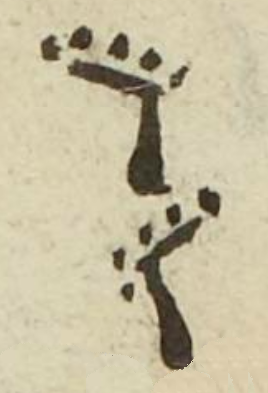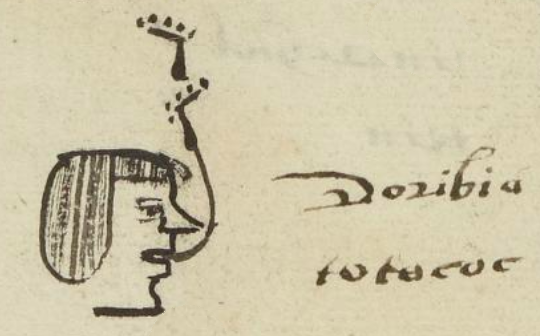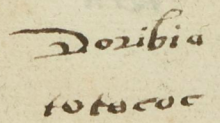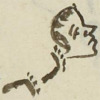Totococ (MH622r)
This black and white simplex glyph for the personal name or situation of Totococ ("Sent into Exile") shows two alternating footprints going upwards. The footprints provide a semantic indication for leaving, but they could also provide a phonetic "o" sound (from otli, road).
Stephanie Wood
This could be a person's name, but it might also be that he was punished for an offense and sent into exile.
The gloss identifies a Christian first name (Toribio). He may have been named after Toribio de Benavente, also known as Motolinia ("One Who is Poor or Afflicted"). This was the first word the friar learned in Nahuatl, and he went on to learn the language well. He lived in the monastery in Huejotzingo. Doing a quick search for the name "Toribio" will produce an impressive result.
Footprint glyphs have a wide range of translations. In this collection, so far, we can attest to yauh, xo, pano, -pan, paina, temo, nemi, quetza, otli, iyaquic hualiloti, huallauh, tepal, tetepotztoca, totoco, otlatoca, -tihui, and the vowel "o." Other research (Herrera et al, 2005, 64) points to additional terms, including: choloa, tlaloa, totoyoa, eco, aci, quiza, maxalihui, centlacxitl, and xocpalli.
Stephanie Wood
Doribio
totococ
Toribio Totococ
Stephanie Wood
1560
Jeff Haskett-Wood
salir, exilio, exiliado, huella, huellas, footprint, footprints, steps, pasos, pies, icximachiyotl, xocpalli, icxipamitl, nombres de hombres

totoco, to be sent into exile, https://nahuatl.wired-humanities.org/content/totoco.
Enviado al Exilio
Stephanie Wood
Matrícula de Huexotzinco, folio 622r, World Digital Library, https://www.loc.gov/resource/gdcwdl.wdl_15282/?sp=326st=image.
This manuscript is hosted by the Library of Congress and the World Digital Library; used here with the Creative Commons, “Attribution-NonCommercial-ShareAlike 3.0 License” (CC-BY-NC-SAq 3.0).




